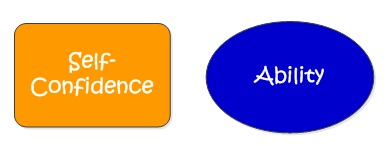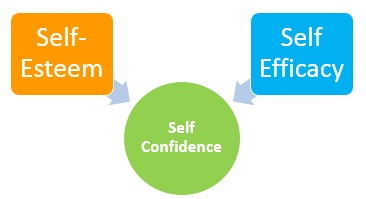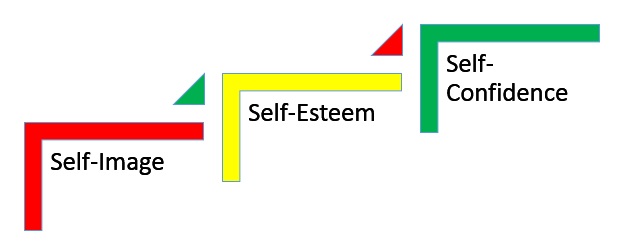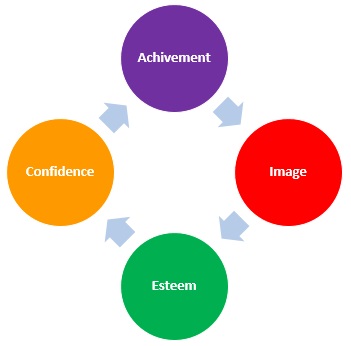Self-Confidence Defined
Self-confidence is assurance in your own abilities, knowledge, judgment, and power. It is an attitude that gives you positive views of yourself and your abilities. It is the “I’m so good” attitude.
About
Self-confidence is an important characteristic or trait to possess. If you lack self-confidence, you often will have self-doubt and struggle to achieve your goals. Even if you have an immense amount of talent, abilities, and knowledge, if you do not have self-confidence you will lack the belief in yourself needed to achieve your personal goals. Conversely, even if you only have average abilities and knowledge, but have self-confidence, chances are that you will achieve what you want to. This is because having self-confidence increases your belief in your ability to be successful, and in turn keep you moving in a positive direction.
Having self-confidence does not mean that you will be able to do everything. It just means that you will continue to be positive and trust your abilities. With self-confidence, you are able to accept setbacks as only temporary, and continue to progress towards accomplishing your goals.
Additionally, self-confidence does not necessarily encompass all aspects of your life. Typically, people have some areas of their lives where they feel more confident, while at the same time they may not feel as confident in other areas. For example, you may be very self-confident in your academic ability, while lacking confidence in your athletic ability. Although confidence may lack in a specific area, many times a person’s overall self-confidence is strong if they have a lot of confidence in their abilities in one particular area.
Self-confident people:
- Trust their abilities and knowledge
- Believe that they will achieve their goals
- Do not perceive their shortcomings or weaknesses as such
- Accept themselves as they are
- Have a sense of control in their lives
- View challenges as opportunities to display their skills
- Accept failures and setbacks as part of life
- Do not depend on the approval of others to make them feel good about themselves
- Do not feel they have to conform in order to be accepted by others
People who lack self-confidence:
- Focus more on their weaknesses
- Do not perceive their strengths or good attributes as such
- Often put themselves down
- Feel a lack of control in their lives
- Depend on approval of others in order to feel good about themselves
- Discount or ignore compliments given to them by others
- Avoid taking risks because they fear they will fail
- Do not expect to be successful in reaching their goals
Influences on Self-confidence
Self-confidence does not directly relate to ability. You can be very talented and knowledgeable and lack self-confidence. On the contrary, you may not have an abundant about of ability, yet have self-confidence. Self-confidence stems from how you see yourself and how you feel about yourself and your abilities. If you feel good about yourself and your abilities, you will have self-confidence. If you do not feel good about yourself and abilities, you will lack self-confidence.
Self-efficacy and Self-esteem
Your self-confidence is, however, directly affected by both self-efficacy and self-esteem.
Self-efficacy
Self-efficacy is your belief about your ability and capacity to accomplish a particular task or goal. It is how you feel now about your ability to perform future actions in order to produce a certain result. For example, you may feel confident in your ability to play Beethoven’s Symphony 9 on the piano. Self-confidence, unlike self-efficacy, is not limited to a specific task or goal. Self-confidence is your overall assurance in yourself and your abilities in more of a general sense.
Gaining self-efficacy can build self-confidence. You gain self-efficacy when we see yourself and others mastering skills in a particular area of expertise. This is the notion that, if you work hard in a particular area, you will succeed. Success builds confidence. That confidence helps assure you when faced with difficult challenges and when you have to deal with setbacks and failures. The more confidence you build up in your ability to perform specific tasks, your overall self-confidence will grow.
Self-esteem
Self-esteem is a Person’s opinion or judgment of his or her own worth. Self-confidence is directly connected to self-esteem, and self-esteem is directly connected to self-image. By improving your self-image, you can improve your self-esteem. By viewing yourself in a positive way, you will see the value you have to others. The more value or worth you feel you have the higher your self-esteem. Improved self-esteem tends to lead to improved self-confidence. Feeling valuable gives you confidence in your abilities. With improved self-confidence, you tend to attempt more. Success and achievement in different areas of your life increases your self-image, self-esteem, and self-confidence. This positive cycle continues to feed into itself making you feel good about yourself.
Building Self-confidence
There are several ways you can increase your self-confidence. However, it is not a quick process. Building self-confidence takes time and effort. It entails changing your mindset that can be a challenging task.
It is believed that your self-confidence is partially innate (you are born with) and partially something that is develops over the years. When you are first learning to walk, you may be very confident you can do it and let go of your parent’s hand, or you may not be confident and hold tightly on to their hand. Because this is seen so early on in life, some researchers believe this is a sign that much of your self-confidence is a personally trait or an inherent characteristic. This, however, do not mean it cannot be strengthened over time. You can build self-confidence by developing a positive self-image, achieving goals, creating a positive mindset, emphasizing your strengths, changing your perceptive, and embracing all your qualities.
Your self-confidence can be built up or lowered over the years. You have created a perception of yourself and your abilities much of which is based on your experiences and interactions with others. If you had positive experiences and encouraging interactions, you probably have a positive view of yourself. That positive view can increase your self-confidence. Conversely, if you had negative experiences, you may have lowered your self-confidence. These negative experiences can be personal failures or interactions with others who put down your abilities. No matter what level it is at today, it can change over time.
To improve your self-confidence, start by creating a positive self-image of yourself in your mind’s eye. Imagine yourself as a strong, talented, confident, and valuable person. Foster this positive image of yourself. Do not focus on your weaknesses or perceived shortcomings. Accept your flaws and weaknesses as your uniqueness. Everyone has them; it is called being human. If you do not like one of your weaknesses, work on it. For example, if you think your flaw is being impatient, work to become more patient. We all have characteristics about ourselves that we do not particularly like, it just gives us something to work on to make us feel better.
Setting and achieving goals is a good way to build self-confidence. Personal achievements build competence. Competence builds self-confidence, and success builds on success. If you are successful in reaching your goals, this in turn will strengthen your self-confidence.
Having a positive mindset will also increase your self-confidence. Being positive and optimistic about what you can accomplish will help you achieve your goals. If you focus on your strong attributes and abilities, you will develop a positive mindset.
Remember, building self-confidence is a process that takes time. The more activities you do to increase your self-confidence, the quicker it will increase and the stronger it will be.






